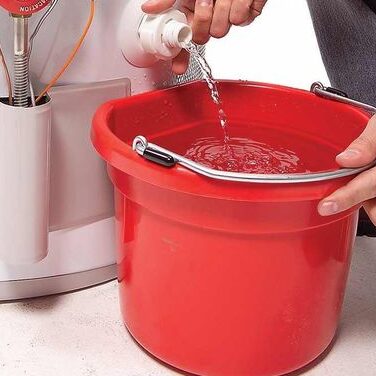A warm shower in the morning or a relaxing bath at night – our trusty water heaters provide us with the comfort we often take for granted. However, when your water heater starts acting up, it can throw your daily routine into disarray. The big question that arises at this point is whether to repair the water heater or replace it.

I’ll explore common water heater problems and guide you through the decision-making process according to Plumbing Corinth TX.
Signs of Water Heater Issues:
Before deciding between repairing and replacing your water heater, it’s important to recognize the signs of trouble. Here are some common indicators that your water heater might be having problems:
- Inadequate Hot Water: If your water heater no longer provides enough hot water for your needs, it’s a clear sign that something is amiss. This could be due to a variety of issues, including a faulty thermostat, heating element, or sediment buildup in the tank.
- Rusty or Discolored Water: Rusty or discolored hot water is often a sign of corrosion inside the water heater tank. Over time, this can lead to leaks and other problems.
- Strange Noises: If you hear popping, rumbling, or banging sounds coming from your water heater, it may indicate sediment buildup in the tank. This can reduce the heater’s efficiency and even damage the tank.
- Leaking: A leaking water heater is a clear sign that something is wrong. Leaks can occur due to corrosion or pressure valve issues. Ignoring a leak can lead to water damage in your home.
- Age of the Water Heater: Most conventional water heaters have a lifespan of 10-15 years. If your unit is older and experiencing issues, it may be more cost-effective to replace it rather than continue with repairs.
Repairing Your Water Heater:
In many cases, a water heater issue can be resolved with repairs. Here are some common problems and their potential solutions:
- Replacing a Faulty Thermostat: If the water isn’t getting hot enough, a faulty thermostat may be to blame. Replacing it is a relatively straightforward and cost-effective repair.
- Replacing a Burned Out Heating Element: Electric water heaters use heating elements to warm the water. When one of these elements burns out, it can be replaced.
- Flushing the Tank: If you’re hearing strange noises from your water heater, it may be due to sediment buildup. Flushing the tank can resolve this issue and improve the unit’s efficiency.
- Fixing Leaks: In some cases, leaks can be repaired by replacing a faulty pressure relief valve or a corroded pipe. However, extensive tank corrosion may require replacement.
- Anode Rod Replacement: Water heaters have an anode rod that helps prevent corrosion. Replacing a corroded or depleted anode rod can extend the life of the heater.
When to Consider Replacement:
While repairs can address many water heater issues, there are situations in which replacement is the more practical choice:
- Age of the Unit: If your water heater is approaching the end of its expected lifespan (10-15 years for most units), it’s often more cost-effective to replace it rather than continually investing in repairs.
- Severe Corrosion: Extensive corrosion inside the tank is a sign that your water heater is on its last legs. Corrosion weakens the tank, making it prone to leaks.
- Repeated Repairs: If you find yourself frequently calling for repairs, it may be a sign that your water heater is no longer reliable. The cost of multiple repairs can quickly add up.
- Inefficiency: Older water heaters are less energy-efficient. Replacing an older unit with a more energy-efficient model can result in long-term savings on your utility bills.
- Changing Hot Water Needs: If your household has grown, or if your hot water needs have significantly increased, your current water heater may no longer be sufficient. In such cases, upgrading to a larger unit may be necessary.
Choosing a Replacement Water Heater:
When it’s time to replace your water heater, you’ll have several options to consider:
- Conventional Tank Water Heaters: These are the most common type of water heaters and store and heat water in a tank. They are relatively affordable but less energy-efficient.
- Tankless Water Heaters: Tankless or on-demand water heaters heat water as you need it, providing endless hot water and higher energy efficiency. However, they tend to have a higher upfront cost.
- Heat Pump Water Heaters: These units use electricity to move heat from the air or ground to heat the water. They are energy-efficient but may have higher upfront costs.
- Solar Water Heaters: Solar water heaters use energy from the sun to heat water. While they are environmentally friendly, they require an upfront investment and are most effective in sunny climates.
- High-Efficiency Gas Water Heaters: These units use natural gas and are more energy-efficient than standard gas water heaters. They have a lower operating cost over time.
Conclusion:
Based from Plumbing Corinth TX, deciding whether to repair or replace your water heater depends on the specific issue, the age of the unit, and your long-term hot water needs. Regular maintenance can extend the life of your water heater and reduce the likelihood of emergencies. When in doubt, consult a professional plumber who can assess the situation and provide expert advice on the best course of action.
Corinth’s Best Plumbing & Hydro Jetting
2705 Meadowview Dr, Corinth, TX 76210, United States
940-286-3137
